A Conversation with Christoph Huber at Porgy & Bess, Vienna, Austria
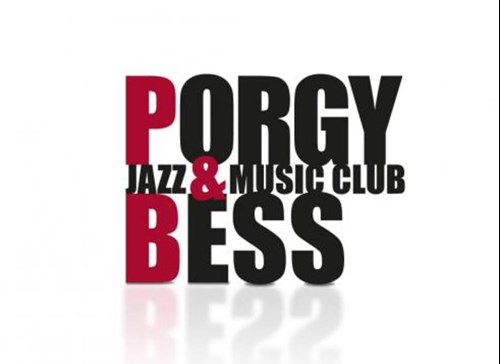
After the great NASOM Concert on September 29th, 2020 I had a conversation with Cristoph Huber, the artistic director of Porgy & Bess in Vienna. Porgy & Bess is the best Jazz venue in Austria and likely in the whole of Europe. It is also considered one of the best five jazz venues in the world. As a non-profit organisation Porgy & Bess defines itself as a Jazz & Music Club with a pluralistic and multifaceted programme.
Since 1993 Christoph Huber has been Porgy & Bess Jazz & Music club's artistic/organizational director (together with Mathias Rüegg, Renald Deppe and Gabriele Mazic). Since 2000 he has been Director of the “New” Porgy & Bess in the rooms of the legendary Rondell-Kino in the center of Vienna. From 1991 to 1998 he was the co-organizer (together with Gerhard Eder) of the International Jazz Festival Saalfelden.
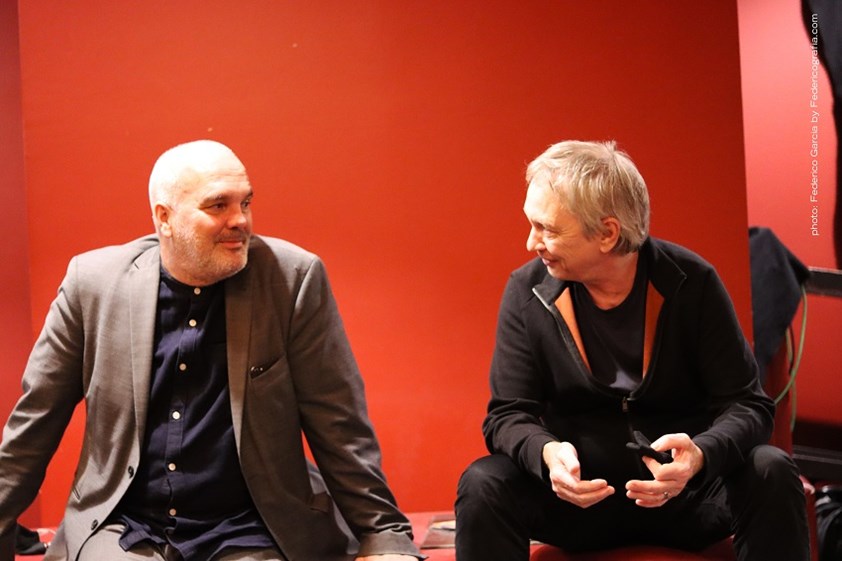
Christoph Huber with Helge Hinteregger
Christoph Huber, thank you very much for accepting this invitation to share your thoughts about your Porgy and Bess.
Christoph Huber: It's a great pleasure. Thank you very much for the invitation.
Porgy & Bess is known all over the planet and over the years you've been inviting so many musicians from so many different countries from different kinds of jazz, but you've been supporting Austrian jazz as well. So please tell us a little bit about your experience.
Christoph Huber: Look, it's very easy because we don't think about genres. We don't think about styles. We think about quality and we think that what is important is to develop this kind of music. So it's not that we support Austrian music because we have to support Austrian music. We support Austrian music because the scene is very creative and we tried to make the scene very creative as well, because for the club it's important that we have a working place here yet and that the stage is working in the sense that it can develop the scene or the music in our consciousness. Porgy & Bess is called Jazz and Music club, Jazz and Music that's the subtitle. Jazz is in the center and music is the part we take concerning different developments around the field of jazz, but we didn't know that, like 20 years ago or so.
In the 1990's we spoke about electronic music. Now we can speak about singer/songwriters, which is not really based in jazz, but it has something to do with that. That's the point we're interested in a kind of a development. Of course we try to develop and bring ahead the music that happens here. I think that in the last years, the Austrian scene has developed itself in a very, very good way, in different directions and that's something we want to support. We not only want to support it, but we want to be part of it. We want to realize that because there are not so many stages where you really can create something. We think about Porgy & Bess as a club that has the possibility of creating new kinds of music because of the fact every day there's a concert and that we can allow ourselves a lot of things, which just can fail.
It's not like everything must succeed. It's just that a couple of things can just miss the point or whatever and simply it cannot happen. But when you don't create such a stage, then you also cannot create a highlight. In the last years or in the last century, I've seen and heard a lot of highlights here, and that's also because we simply allow projects, things which you cannot foresee. It just happens and it can be great. If it's not great, you try to make them great. That's what we try to do.
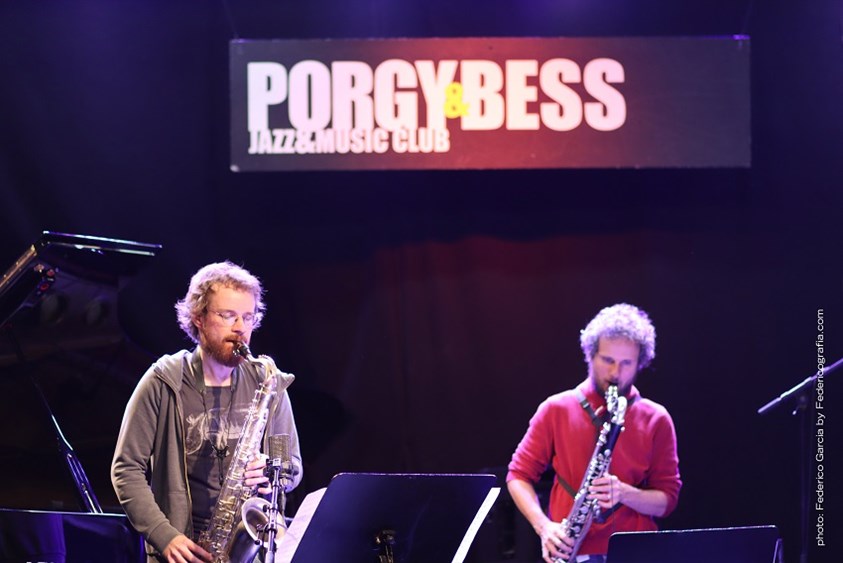
Sketchbook
When did the Porgy & Bess adventure start here in Vienna?
Christoph Huber: Look, it's a long time ago. Actually, I was a cook when Porgy & Bess was founded by Mathias Rüegg, a musician from Switzerland who was based here and was the lead of the Vienna Art Orchestra, a great orchestra. He did this stuff in the early 90's. This year is our 28th season, which is quite long. I joined Mathias also in late 93. So I'm part of this company since the beginning.
And you're one of the founders.
Christoph Huber: Yes and I still love it. It's great and it's my life, it's my music. It's what I really want to be. For me it's like it's not an occupation, it's not a job. It's a passion. Yes, I love this music and I love to present it here on this stage from time to time, because we do hear concerts every day.
Seven days a week, 365 days each year, that is fantastic.
Christoph Huber: Yes, we play but we do more because we have a small space upstairs. We do small experiments, experimental concerts in the so called “Strenge Kamer”, which is a room for 30 people. We do a lot, and we do a lot because we want to do it and that - we think - there is a need to do it. And even if the audience doesn't really recognize that it's important to do it, it's important to do it. So we do it .
With so many concerts you've been part of and organized, could I ask you a dangerous question? Do you have one concert that really brightens up your heart and stays in your memory?
Christoph Huber: There are a lot of concerts I have the best memory of. The concert from last night with Wolfgang Mieterer, Wolfgang Puschnig and Herbert Pirker, was really amazing, They played something around Beethoven. It was amazing.
But I don't think about that at all because there's not one single concert I can choose. I have seen a lot of concerts that really have touched me, many concerts.
We are in Austria and soon I will have an Austrian Jazz series on my radio program Jueves de Jazz, that is why I put the finger specifically on Austin jazz. During the last 30 years you have eyewitnessed the Austrian Jazz evolution. Do you believe there are changes taking place in the Austrian Jazz arena today? How do you see the Austrian jazz arena?
Christoph Huber: Of course, there is change, I mean, the change is there because of the possibilities to play, to develop music, to have the ability to develop something and I think Porgy & Bess is a good place for that. But of course I'm very subjective in this case. Without this club, a lot of things wouldn't work that well, or wouldn't develop that well, and that's something I recognized or also people tell me that. And it's not that I'm so proud of that.
It's like a working process, it is something you have to do. From the beginning this was in our concept, it was always clear that we would take care of the Austrian scene, but in the same time we didn't want to be only an Austrian jazz club. We live in Europe and jazz is world-wide. So for us it was clear. It's about the Austrian scene on the one hand, and the international scene on the other hand. That's the point and we never changed our concept. So the official concept we apply for in the Ministry is the same concept we wrote in 1993 and there was no need to change it because it was clear and it was already right. That was the point where we said "that's what we want to do". And we never did any change because it was on the spot. It was to the point and it still is.
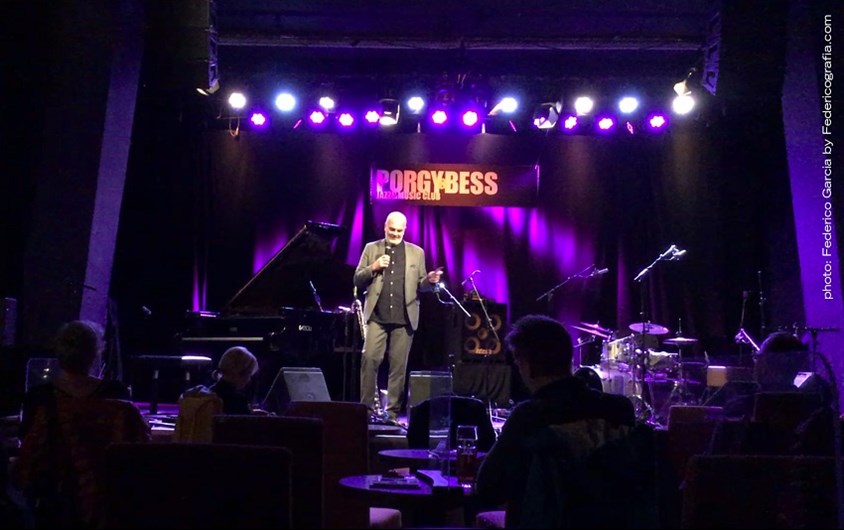
Tonight, the 29th of September, 2020 a very chaotic and sort of very surprising year I've seen a magnificent concert: the NASOM concert at Porgy & Bess, the second so far, organised together with Mica Music Austria and the Ministry of Foreign Affairs. Could you please talk about this cooperation and the NASOM concert?
Christoph Huber: We cooperate with them since many years ago, we live here and we cooperate with the Ministry. We cooperate with the State. We cooperate with the City. We cooperate with Mica Music Austria since many years ago. And that's okay, and it's a good form of cooperation. This NASOM program in this case is a very special program. It is called New Austrian Sound of Music, which is great because Austrian Sound of Music is a very popular musical. Everyone knows it except people from Austria because that's unknown here. It's a cliché. That's really a cliché, but it's okay. At least it gives good vibes and for me that's okay.
New Austrian Sound of Music is just to try to get people (musicians) out of Austria, who are really on the spot to develop something which can be international and useful. It's not like the Sound of Music doing Edelweiss. It's Sound of Music just to get out of that and we're living in 2020 now and that's our stuff. It's our history, it's our language, that's how we use this language. That's the point and you have to encourage them. You just have to take care about that, so they should go a step further. And even if they fail, it's good that they took a step further.
We don't want them to fail, but there is a possibility that just they can fail. That's something which is also very important and then I come back to what I said before, because without that you cannot create any habit. You have to fail and you have to fall. Many obviously are really on the safe side. You can be a bank manager and even then you are not on the safe side. So we don't want to be bank managers.
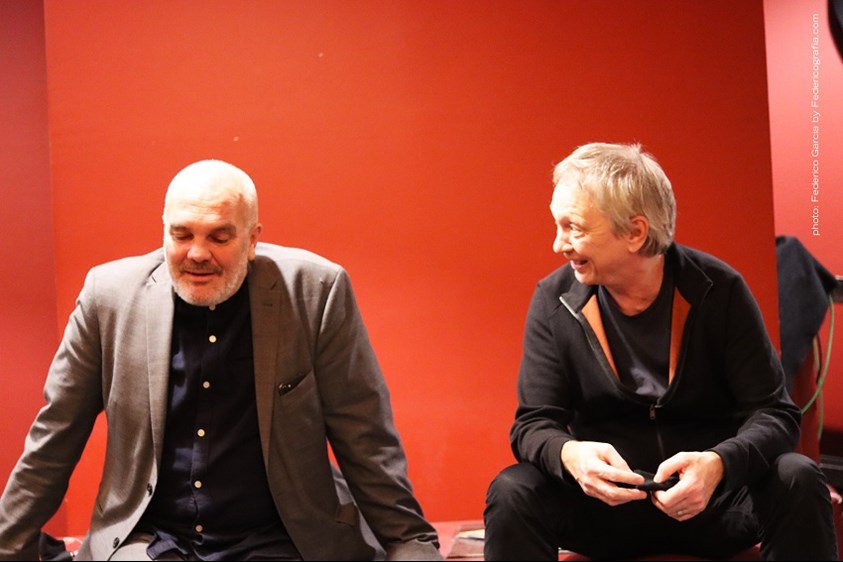
Christoph Huber with Helge Hinteregger
Let us go back to Porgy & Bess and the great support/cooperation in this case you have with Mica. Together with Helge Hinteregger from Mica at Porgy & Bess you have a great festival called Kick Jazz festival which happens on December since five years ago, I believe. And during two days you present six great bands each year. Can you tell me your personal experience with the Kick Jazz Festival?
Christoph Huber: Look, for me it has a clear effect because we produce a lot of interesting Austrian bands here and we try to bring them forward and such a festival is a great pleasure. It's always great to present it. For us it's perfect when we have a partner or someone who is supporting that. So Mica is a very good cooperation possibility for us. But whenever we recognize a talent, we will give them a stage and it doesn't matter who is supporting them. It's just the point that we say, okay, that's interesting and we do it and even if no one believes in that we will insist. So that's the point.
Now one sort of harsh question: You opened just after the lockdown that Vienna and Austria went through in the last months with this duo Hofmaninger and Schwarz, two very talented girls who are making magic with their music. You opened in August but before, like all over the place in Europe and America you Austrians were confined too. I live in Belgium and in Brussels it has been a nightmare for clubs and festivals. There are no festivals taking place still right now up there. What has been your experience after this pandemic pandemonium we are going through?
Christoph Huber: (Laughs) Well, I think... what should I say? I mean, the experience with this pandemic is a disaster. I don't see any positive point out of that, but the pandemic is here and you have to face it, and we thought about that too. We thought about not only how can we get through the situation, but what can we do? The point was: what can we do to protect the people working for us? So they don't have to go to state departments asking for money or things like that. We just wanted to keep them in our business, in our company, and just tell them, okay now we take care of your needs. And that not only means the people who are directly involved in Porgy & Bess, but also people like musicians. We just thought: what can we do to give them a stage? The idea that came out of this was that we had to go online.
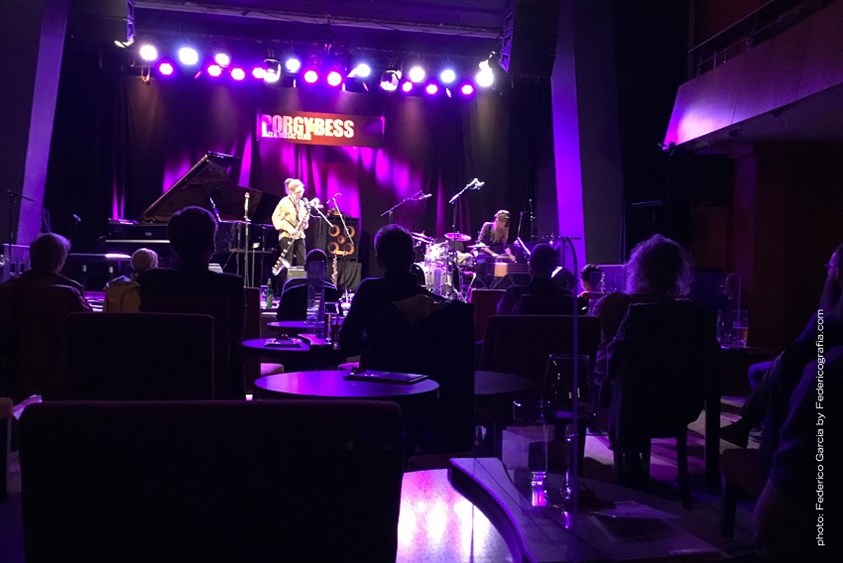
Duo Hofmaninger/Schwarz
That's great.
Christoph Huber: We have to open the door to say: now it's not possible that people can join us in the club, but we can engage musicians. We can pay them a fee and we can just say that the show must go online. That's true. That was what we thought. And we recognize that it's possible for the musicians to play on stage without an audience. That works. It wasn't clear at the beginning, but then it was clear and that's why we did it.
And then we hooked up this kind of stuff. It wasn't easy. It was a combination of cooperation with the Academy, with friends. We did that and in the beginning that was enormous because of people really, they also donated a lot. So that was super fair and super fast.
So it has been through donations.
Christoph Huber: Indeed, it was “Pay as you wish”. We just said, this room is free, but they just should donate something. But only what they wanted, and in the beginning it was high. Now it's not a lot anymore, but I'm pretty sure it was correct to do it. And we do it, we don't want to stop it because we found this kind of door and this kind of window.
I have seen your program's brochure, it is nicely printed. Actually you really have a great corporate identity at Porgy & Bess.
Christoph Huber: Yes, and it's the same guy who is taking care of that for already 28 years.
As a graphic designer I can say the Austrian design and your designer are awesome, really.
Christoph Huber: But a lot of people also say they can't read the texts and things. It was like in-between. I think we found something like a corporate identity and it's not that we're so proud of that, but it's just that we developed it. It's fine. I think we go ahead with that too. So we don't really change it.
I see in the brochure that you actually have a full program until October.
Christoph Huber: And even through November we'll play every day and maybe a single concert can be cancelled because for example you don't know when the musicians from Denmark can come to Austria. Then you have to cancel it. But we take care of that until now, I mean, in the lockdown we did like 50 concerts and now meanwhile let's say 40 and not one concert was cancelled. We had many people, like half of the town (Vienna) and we did it and it was great that we did it. Many of us just think about economy. It doesn't make a lot of sense, of course culture itself has something to do with economy, but when economy is the only figure or the only thing which counts, I mean, sorry, I don't want to be part of this game.
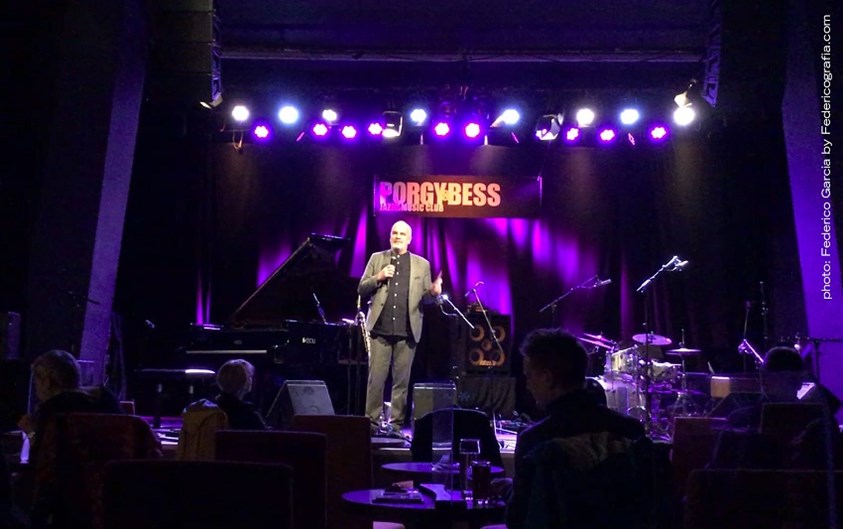
Indeed, they are killing culture all over the place.
Christoph Huber: Of course they kill it, but we don't let us be killed because someone wants to kill us. We just say okay, what is the possibility? And then you find a spot, you have to take it or not. Then it's your responsibility to do that, which is not working yet. That's what it is.
This will be my last question and maybe a tough one. Based on your experience and your love for music, for jazz, I would like to ask you what would be your message, your vision to share with musicians and even with people who own little venues here and there in different parts of Europe who maybe are supporting musicians, and sometimes as well they don't want to let themselves be destroyed by the circumstances. What would be your message?
Christoph Huber: No idea. I'm not the Messiah you know, I can't say. But I love jazz, I love jazz musicians. I think this is a form of communication concerning the possibility of improvisation, I think that's the point. I think it's about improvisation and that's like a trademark, and that's what this is all about. You have to improvise. And when you don't improvise, your whole life might be difficult. So it is easier when you have the possibility to think about improvisation and that's what jazz means to me. It's like a way of life, but because of the fact that it has this spot or it has a great kind of possibility to be someone who can improvise. And that's what it is. I would recommend to anyone to think about that, because I think it makes life easier when you have the ability to improvise.
Christoph Huber thank you very much for this great conversation.
Christoph Huber: My pleasure.
Text and photography © Federico Garcia (Jueves de Jazz)
http://radioalma.eu/jazz/author/jazz/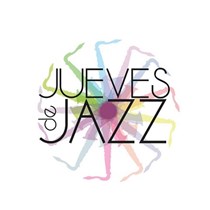
Other
In case you LIKE us, please click here:

Foto © Leentje Arnouts
"WAGON JAZZ"
cycle d’interviews réalisées
par Georges Tonla Briquet

our partners:



Hotel-Brasserie
Markt 2 - 8820 TORHOUT

Silvère Mansis
(10.9.1944 - 22.4.2018)
foto © Dirck Brysse

Rik Bevernage
(19.4.1954 - 6.3.2018)
foto © Stefe Jiroflée
Philippe Schoonbrood
(24.5.1957-30.5.2020)
foto © Dominique Houcmant

Claude Loxhay
(18/02/1947 – 02/11/2023)
foto © Marie Gilon

Pedro Soler
(08/06/1938 – 03/08/2024)
foto © Jacky Lepage
Special thanks to our photographers:
Petra Beckers
Ron Beenen
Annie Boedt
Klaas Boelen
Henning Bolte
Serge Braem
Cedric Craps
Luca A. d'Agostino
Christian Deblanc
Philippe De Cleen
Paul De Cloedt
Cindy De Kuyper
Koen Deleu
Ferdinand Dupuis-Panther
Anne Fishburn
Federico Garcia
Jeroen Goddemaer
Robert Hansenne
Serge Heimlich
Dominique Houcmant
Stefe Jiroflée
Herman Klaassen
Philippe Klein
Jos L. Knaepen
Tom Leentjes
Hugo Lefèvre
Jacky Lepage
Olivier Lestoquoit
Eric Malfait
Simas Martinonis
Nina Contini Melis
Anne Panther
France Paquay
Francesca Patella
Quentin Perot
Jean-Jacques Pussiau
Arnold Reyngoudt
Jean Schoubs
Willy Schuyten
Frank Tafuri
Jean-Pierre Tillaert
Tom Vanbesien
Jef Vandebroek
Geert Vandepoele
Guy Van de Poel
Cees van de Ven
Donata van de Ven
Harry van Kesteren
Geert Vanoverschelde
Roger Vantilt
Patrick Van Vlerken
Marie-Anne Ver Eecke
Karine Vergauwen
Frank Verlinden
Jan Vernieuwe
Anders Vranken
Didier Wagner
and to our writers:
Mischa Andriessen
Robin Arends
Marleen Arnouts
Werner Barth
José Bedeur
Henning Bolte
Erik Carrette
Danny De Bock
Denis Desassis
Pierre Dulieu
Ferdinand Dupuis-Panther
Federico Garcia
Paul Godderis
Stephen Godsall
Jean-Pierre Goffin
Claudy Jalet
Chris Joris
Bernard Lefèvre
Mathilde Löffler
Claude Loxhay
Ieva Pakalniškytė
Anne Panther
Etienne Payen
Quentin Perot
Jacques Prouvost
Renato Sclaunich
Yves « JB » Tassin
Herman te Loo
Eric Therer
Georges Tonla Briquet
Henri Vandenberghe
Peter Van De Vijvere
Iwein Van Malderen
Jan Van Stichel
Olivier Verhelst



